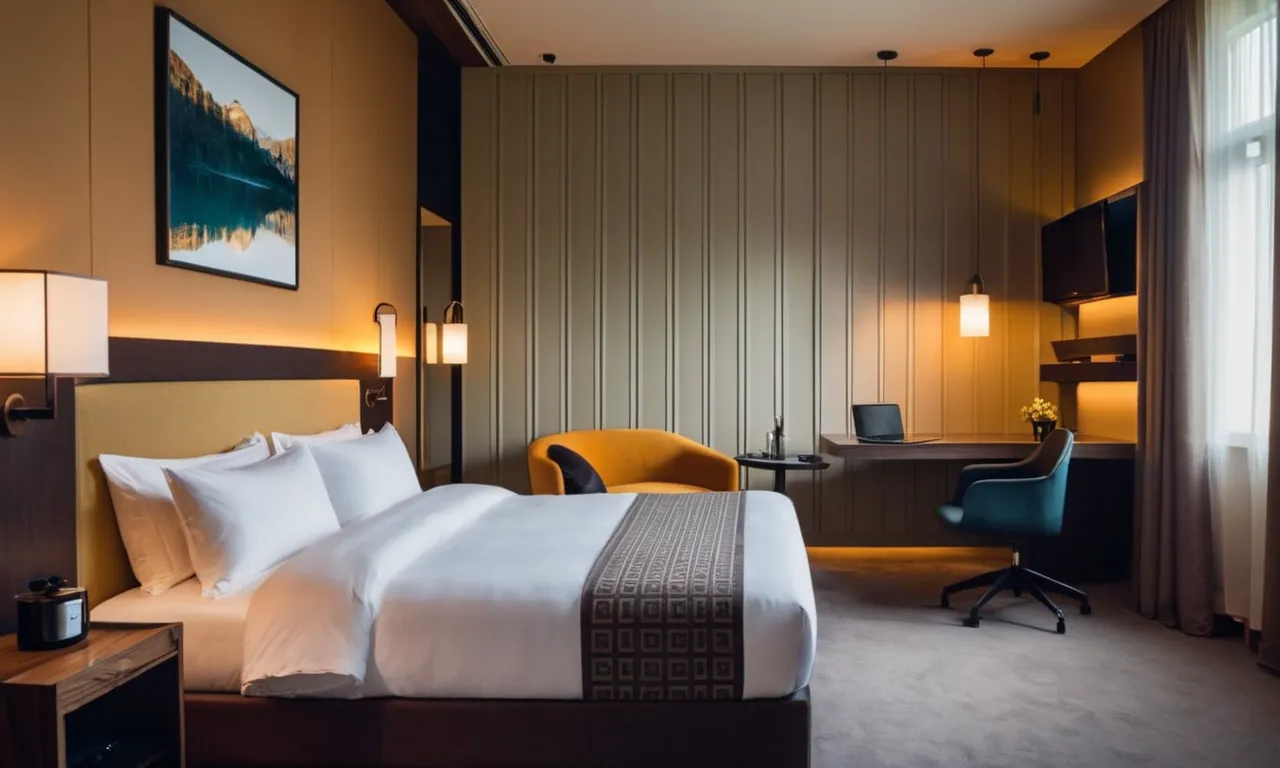What Is A Micro Hotel? A Comprehensive Guide
In the ever-evolving world of hospitality, a new trend has emerged that caters to the modern traveler’s desire for affordability, convenience, and minimalism – the micro hotel.
If you’re short on time, here’s a quick answer to your question: A micro hotel is a compact, space-efficient accommodation concept that offers small but well-designed rooms with essential amenities at an affordable price point.
In this comprehensive guide, we’ll delve into the intricacies of micro hotels, exploring their origins, design principles, target audience, and the advantages they offer over traditional hotel accommodations.
We’ll also address common concerns and provide insights into the future of this innovative lodging concept.
The Rise of Micro Hotels
Origins and Inspiration
The concept of micro hotels, also known as capsule hotels or pod hotels, originated in Japan in the late 1970s. It was born out of necessity, as the country faced a shortage of affordable accommodation options, particularly in densely populated cities like Tokyo.
Inspired by the compact living spaces common in Japanese culture, the first micro hotels offered travelers a budget-friendly and minimalistic lodging experience. These innovative spaces were designed to cater to the needs of businesspeople and travelers seeking a place to rest and recharge during their brief stays.
Addressing the Needs of Modern Travelers
In recent years, micro hotels have gained popularity beyond their origins, resonating with the changing preferences of modern travelers. As the world becomes increasingly urbanized and cities grapple with limited space, these compact accommodations offer a practical solution.
They cater to travelers who prioritize affordability, convenience, and a streamlined experience over lavish amenities. According to a survey by Hotel News Resource, 62% of travelers consider micro hotels an attractive option for short stays. Additionally, micro hotels appeal to eco-conscious travelers who value sustainable and minimalistic living.
These compact lodgings are often strategically located in prime urban areas, offering easy access to transportation, dining, and entertainment. They provide a unique opportunity for travelers to immerse themselves in the local culture and experience the city like a resident.
Moreover, micro hotels cater to the growing trend of solo travel, offering a safe and comfortable haven for individuals exploring new destinations on their own.
Sustainability and Minimalism
Micro hotels embrace the principles of sustainability and minimalism, which have become increasingly important in the hospitality industry. By occupying a smaller footprint and utilizing efficient design, these accommodations reduce their environmental impact.
They often incorporate eco-friendly materials, energy-efficient systems, and waste reduction strategies. A study by Green Hotelier found that micro hotels can consume up to 30% less energy compared to traditional hotels.
Beyond their environmental benefits, micro hotels also reflect the minimalist lifestyle embraced by many modern travelers. Guests are encouraged to declutter and focus on the essentials, fostering a sense of simplicity and mindfulness during their stay.
The compact yet thoughtfully designed spaces promote a minimalistic approach to travel, challenging the notion that luxury equates to excess. Instead, micro hotels offer a refreshing alternative that celebrates functionality, efficiency, and a conscious way of living 😊.
As the world continues to evolve and embrace new perspectives on travel and accommodation, micro hotels are poised to play an increasingly significant role. Their ability to adapt to changing trends, address sustainability concerns, and cater to the needs of modern travelers make them a compelling option in the ever-expanding hospitality landscape 🌟.
Micro Hotel Design Principles
In the ever-evolving world of hospitality, micro hotels have emerged as a unique concept that challenges traditional notions of hotel design. These compact accommodations prioritize efficiency, functionality, and minimalism, offering travelers a fresh and innovative experience.
At the heart of micro hotel design lie three fundamental principles that shape their distinctive character.
Space Optimization and Efficient Layouts
Micro hotels excel at making the most of limited square footage. Their layouts are meticulously planned to optimize every inch of space, ensuring that guests have everything they need within an efficient and well-organized environment.
From cleverly designed sleeping areas to multifunctional living spaces, micro hotels demonstrate that size is not a barrier to comfort and convenience. According to a study by Hotel News Now, micro hotels typically range from 150 to 350 square feet, catering to travelers seeking affordable and practical accommodations in urban settings.
Multifunctional Furniture and Smart Storage Solutions
To maximize the limited space, micro hotels employ innovative furniture designs and smart storage solutions. Multifunctional pieces, such as fold-down beds, convertible sofas, and modular units, allow guests to adapt their living spaces to suit their needs.
Built-in storage compartments, wall-mounted shelves, and hidden compartments provide ample room for personal belongings, ensuring an organized and clutter-free environment. Companies like Resource Furniture have pioneered transforming furniture systems that seamlessly integrate into micro hotel designs, enabling guests to reconfigure their rooms with ease.
Minimalist Aesthetics and Thoughtful Amenities
Micro hotels embrace a minimalist aesthetic, creating a sense of calm and tranquility within their compact spaces. Clean lines, neutral color palettes, and carefully curated decor elements contribute to a serene and uncluttered ambiance.
While minimalist in design, micro hotels don’t compromise on amenities. They offer thoughtfully selected amenities tailored to the needs of modern travelers, such as high-speed Wi-Fi, smart TVs, and energy-efficient appliances.
Some micro hotels, like Citizen M, even incorporate communal spaces and social hubs, allowing guests to connect and socialize while enjoying a range of amenities.
By adhering to these design principles, micro hotels have carved out a unique niche in the hospitality industry, appealing to travelers seeking affordable, practical, and sustainable accommodations without sacrificing comfort or style.
As urban living continues to evolve, the micro hotel concept is poised to thrive, offering an innovative solution to the challenges of space and resource constraints in densely populated cities. So, the next time you’re planning a city getaway, consider experiencing the ingenious world of micro hotels – where small spaces create big impressions!
👏😊
The Target Audience for Micro Hotels
Solo Travelers and Digital Nomads
Micro hotels have become an increasingly popular choice for solo travelers and digital nomads seeking affordable and convenient accommodations. These compact living spaces cater to individuals who prioritize minimalism, functionality, and cost-effectiveness.
With a focus on essential amenities and a central location, micro hotels offer a practical solution for those who spend most of their time exploring the city or working remotely. According to a Statista report, the global hostel and motel industry is projected to generate revenues of over $36 billion by 2025, indicating a growing demand for budget-friendly accommodations like micro hotels.
Budget-Conscious Tourists
Micro hotels have become a go-to option for budget-conscious tourists seeking affordable lodging without compromising on location or basic amenities. These compact spaces offer a cost-effective alternative to traditional hotels, allowing travelers to stretch their vacation budgets further.
With rates often lower than standard hotel rooms, micro hotels cater to those seeking a comfortable place to rest their heads without breaking the bank. A study by Hotel Management revealed that 62% of travelers prioritize affordability when choosing accommodations, making micro hotels an attractive choice for cost-conscious vacationers.
Psst… Did you know that some micro hotels even offer shared amenities like lounges and kitchenettes to enhance the communal experience while keeping costs low? It’s a win-win situation for budget-savvy explorers!
Urban Explorers and Short-Stay Guests
Micro hotels have found a niche among urban explorers and short-stay guests who value a central location and a no-frills approach to lodging. These compact accommodations are often strategically located in the heart of cities, providing easy access to local attractions, nightlife, and public transportation.
For those visiting a city for a quick business trip, a weekend getaway, or a layover, micro hotels offer a convenient and affordable solution. According to Phocuswire, the micro-hotel sector is expected to experience significant growth by 2023, driven by the increasing demand for compact and efficient accommodations in urban areas.
Imagine waking up in the vibrant heart of a bustling city, with all its excitement and adventures just steps away – that’s the allure of micro hotels for urban explorers and short-stay guests!
Advantages of Micro Hotels
Affordability and Value for Money
One of the primary advantages of micro hotels is their affordability and exceptional value for money. These compact accommodations provide a cost-effective alternative to traditional hotels, making them an attractive option for budget-conscious travelers.
By optimizing space and eliminating unnecessary amenities, micro hotels can offer competitive rates without compromising on essential services. According to a study by Hotel News Resource, micro hotels can offer up to 30% lower room rates compared to traditional hotels in the same area.
This affordability factor appeals to a wide range of travelers, including solo adventurers, business travelers on a tight budget, and families seeking affordable accommodation.
Convenient Locations and Accessibility
Micro hotels are often strategically located in urban centers, providing guests with convenient access to key attractions, business districts, and transportation hubs. By capitalizing on their compact footprint, these hotels can be situated in prime locations where traditional hotels may not fit due to space constraints or high real estate costs.
This accessibility factor is a significant advantage for travelers who prioritize proximity to their desired destinations. According to Statista, as of 2021, there were over 600 micro hotels globally, with a significant concentration in major cities like New York, Tokyo, and London.
Eco-Friendly and Sustainable Practices
Many micro hotels embrace eco-friendly and sustainable practices, aligning with the growing demand for environmentally conscious travel options. By design, these hotels have a smaller ecological footprint due to their compact size and efficient use of resources.
They often incorporate energy-efficient systems, water conservation measures, and sustainable building materials. Some micro hotels even feature innovative solutions like solar panels, rainwater harvesting systems, and on-site composting facilities.
According to Green Hotelier, a leading resource for sustainable hospitality, micro hotels can reduce energy consumption by up to 40% compared to traditional hotels. This commitment to sustainability resonates with environmentally conscious travelers who seek accommodations that align with their values and minimize their carbon footprint.
In addition to these key advantages, micro hotels often boast unique and trendy designs, fostering a sense of community among guests through shared spaces and social hubs. They offer a refreshing alternative to cookie-cutter hotel experiences, catering to travelers seeking a more authentic and immersive stay.
With their affordability, convenience, and eco-friendly ethos, micro hotels are revolutionizing the hospitality industry and attracting a growing segment of travelers who value value, accessibility, and sustainability.
Conclusion
Micro hotels have emerged as a game-changer in the hospitality industry, offering a unique and innovative solution for modern travelers seeking affordable, convenient, and sustainable accommodations.
By embracing minimalism, space optimization, and thoughtful design, these compact lodgings provide a comfortable and functional experience without sacrificing essential amenities or compromising on quality.
As the demand for micro hotels continues to grow, it’s clear that this trend is more than just a passing fad. With their ability to cater to diverse traveler needs and their potential for further innovation, micro hotels are poised to reshape the future of urban accommodations, offering a fresh and exciting alternative to traditional hotel experiences.








